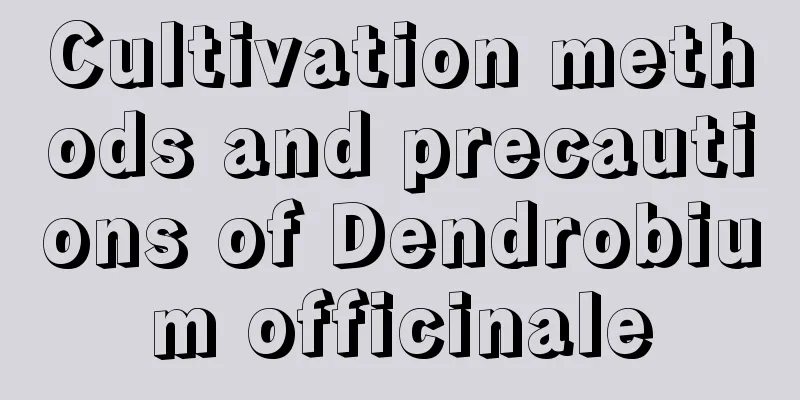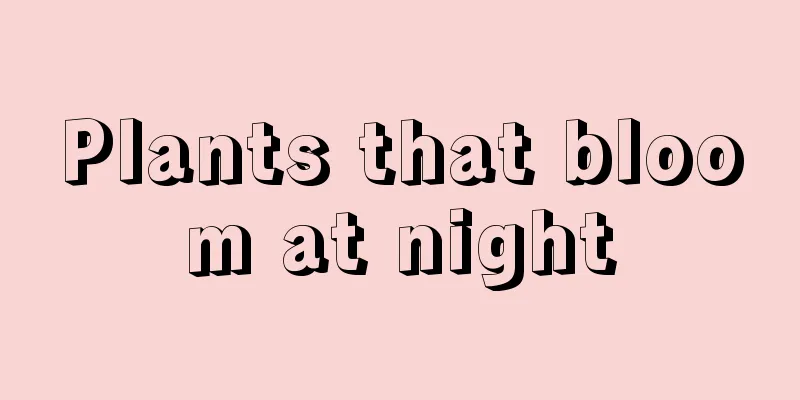Cultivation methods and precautions of Dendrobium officinale

1. Maintenance methods1. Flower pots: The requirements for choosing flower pots are air permeability and drainage. Flower pots made of porous plastic or ceramic are most suitable. 2. Light: It can be exposed to more sunlight in spring and autumn, placed in a place with sufficient light in winter, and placed in a place with scattered light and good ventilation at other times. 3. Temperature: Dendrobium officinale likes a warm environment and can grow in an environment of 18-30℃, and 16-21℃ is the most suitable temperature. 4. Water: The soil humidity of Dendrobium officinale should be high enough in the later stage of planting. If it is too low, it should be watered frequently to keep it moist. You can use a sprayer to replenish water in the form of spray. 2. Breeding techniques1. Pruning: Prune the branches in spring every year, remove the dead stems in the branches together with the old stems, and remove diseased stems, weak stems and problematic roots. 2. Summer: In summer, the temperature needs to be maintained below 30℃, and attention should be paid to shading. When the temperature is too high and there is a lack of water, water should be replenished in time. 3. Problem diagnosis and treatment1. Black spot disease of Dendrobium: The leaves will wither when the disease occurs, which usually occurs from March to May. It can be treated by spraying 1000 times diluted 50% carbendazim. 2. Anthracnose of Dendrobium: Leaves that have been infected with the bacteria will have brown or black spots, which occur from January to May. Use 1000 times diluted 50% carbendazim or 1000 times diluted 50% thiophanate-methyl for spraying for prevention and control. IV. Other issues1. Is it toxic: It is not toxic, and the survival rate of planting is high, and it is not difficult to maintain. 2. Can it be grown at home: Yes, it can be grown at home, because Dendrobium tiangong likes warm and humid places, and scattered light will meet its growth needs. It can be placed in the bedroom without affecting the growth of plants. It can also beautify the environment and purify the indoor air. |
<<: Yam bean cultivation methods and precautions
>>: Cultivation methods and precautions of Wenxin grass
Recommend
Air plants only bloom once in their lifetime
Flowering period of air plants The normal floweri...
How to grow azalea in winter
1. Temperature Rhododendrons prefer cool weather ...
Will cedar bear fruit?
Will cedar bear fruit? Cedar actually has its own...
How to transplant Osmanthus fragrans
Transplanting time of Osmanthus fragrans Transpla...
Forget-me-not varieties
Forget-me-not The Algerian forget-me-not flower i...
What to do if the lucky bamboo leaves become soft
1. Root system problems (1) Specific reasons: Gen...
Cultivation methods of mirror grass (hydroponics and soil cultivation)
1. Hydroponics 1. Light: Generally, it is convert...
How to propagate Phalaenopsis seedlings
1. Flower stalk germination propagation method ① ...
How to cultivate Vajra Bodhi
1. Soil: Vajra Bodhi is suitable for planting in ...
How to grow rosemary more vigorously
Rosemary Growing Conditions Rosemary prefers a wa...
Longevity flowers blooming all over the world
The legend of Kalanchoe Legend has it that a long...
Why is the jujube tree considered an evil tree?
Why is the jujube tree considered an evil tree? T...
How to grow carrots
1. Maintenance methods 1. Temperature: Carrots ar...
The difference between mountain cherry and elmleaf plum
1. Difference between branches and leaves Mountai...
Can lucky bamboo survive if it is frozen?
1. Can it be saved? Lucky bamboo is not cold-resi...









